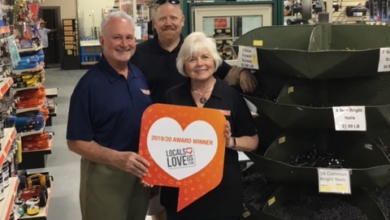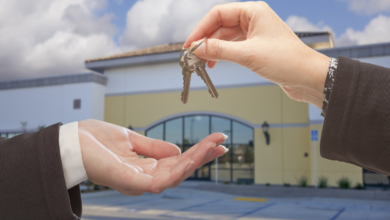Special Report Part II: Rising Up to Battle the COVID-19 Threat
By Chris Jensen

Most home improvement retailers have been in the business for a number of years and they have seen just about everything there is to see in the industry. But no one has experienced a global pandemic before, an ever-evolving crisis that has impacted every aspect of business and personal life regardless of where you live.
Century Club retailers—those in business for more than 100 years—like Mitchell Cohen of Cohen & Co. Hardware in Philadelphia and Rob Bantly of Bantly Hardware in Johnstown, Pa., say they have not experienced anything like the COVID-19 pandemic. Bantly saw his family’s entire store wiped out by a major flood in 1977, so it takes a lot to rattle him.
“I was very concerned about my employees’ well-being and tried to limit sales to essential ones. We tried to keep social distance, but our customers seemingly didn’t have a clue,” he says. Bantly, who is 73, has been staying home for three weeks while keeping his fingers crossed that his employees stay safe and healthy.
The novel coronavirus (COVID-19) is a respiratory disease caused by a new strain of coronavirus that can easily spread from person to person. Older adults and those with chronic health conditions are at high risk, and there is an increased risk of rapid spread of COVID-19 among persons in close proximity to one another. Currently, there is no approved vaccine or antiviral treatment for this disease.
The coronavirus pandemic has surpassed 1.8 million cases worldwide and spread to 210 countries and territories, with more than 115,000 deaths. In the United States, there were over 560,000 confirmed cases and 22,115 deaths as of April 13.
Read on for Part II of our special report on how hardware retailers are rising up to accept the challenge of battling the COVID-19 threat while discovering new ways to serve their communities.

Neighbors Serving Neighbors
Hardware retailers are known for their can-do spirit and commitment to serve their communities, and that has been evident throughout the country as an outbreak evolved into a pandemic.
“Yes, these are indeed challenging times, but we have taken an approach of trying to remind our community of the good and the hope. We have had unbelievable coming together in this community and despite uncertainty we have incredible hope,” says Jason Haley, who operates Ace Hardware of Clarkston (Mich.) with his wife, Melanie.
It was Melanie’s idea to come up with the “Neighbors Serving Neighbors” slogan that has resonated so well with their customer base since the store opened four years ago. That slogan takes on deeper meaning these days. “We both have a spirit for helping,” says Melanie.
Jason posts a daily video message on the store’s Facebook page to keep customers updated on the latest developments. For example, his message on Good Friday noted that big boxes in Michigan are no longer allowed to sell paint and garden center items, but their store is exempt from that restriction because it’s under 50,000 square feet. Click here to view that video.
While most hardware stores are reducing their hours, the Haleys are taking the opposite approach. They are keeping their store open longer, from 7:30 a.m. to 7 p.m., so customers can spread out their shopping, practice social distancing and keep the store from getting busy at any one time.

To further that goal, the Haleys post a “Best Time to Shop” chart, which is a new way for customers to determine the busiest and slowest times in the store (see chart).
“Every week we will be looking at sales by store for every hour, projecting the next week’s customer counts into two-hour segments. We’ll share this information on Instagram and Facebook to help customers with their planning,” says Jason, who adds that 7:30-8:30 a.m. on Monday, Wednesday and Friday are reserved for seniors, first responders, expectant moms and those with compromised immune systems.

Increased Restrictions
When states started issuing stay-at-home orders, hardware and home improvement retailers were initially relieved to learn they were considered “essential businesses” that were allowed to stay open.
While hardware stores are still considered essential, the conditions under which they can operate have changed greatly. Miami-Dade and Fort Lauderdale in Florida have joined Los Angeles in requiring people to wear face coverings while out in public and inside essential businesses.
This comes after the Centers for Disease Control and Prevention (CDC) issued new guidance encouraging people to cover their face while in public, particularly in areas that have seen a surge in cases. On April 2, residents of New York City—which has by far the most cases—were urged to wear homemade masks in public.
In Kentucky, the governor ordered shopping to be done by one person per household if visiting an essential business such as a hardware or grocery store.
In Michigan, the “Stay Home, Stay Safe” order announced April 9 (now extended to May 1) by Governor Whitmer placed major new restrictions on hardware and home improvement stores. All stores that continue in-person sales must establish lines to regulate entry by customers and utilize curbside pickup where possible.
Stores in Michigan under 50,000 square feet must limit the number of people inside the store (including employees) to 25 percent of their occupancy limit. Stores over 50,000 square feet must limit the number of customers in the store at one time to four people per 1,000 square feet of customer floor space; close areas of the store that sell flooring, furniture, paint and garden center items; and create at least two hours per week of shopping time dedicated for certain vulnerable populations.
Alarmed by the large number of groups of four or five people coming into his store, Dave Barone of Barone Hardware & Auto in Bronson, Mich., had already restricted shopping to individuals only as of March 30.
In some counties in Michigan, essential businesses are required to develop and implement a daily health screening protocol of all staff before opening.
For LBM stores, restrictions on construction and homebuilding are a nightmare scenario. In late March, New York shut down all nonessential construction activity until at least April 29. Construction work has also been halted in Pennsylvania, Boston, the Bay Area of California and some municipalities in Miami-Dade.

Builders FirstSource, which operates 400 building supply locations in 40 states, has taken a number of measures to weather this crisis. The company is reducing senior management compensation, delaying capital expenditures, freezing hiring and drawing down $150 million of cash under a revolving credit facility.
The company’s CEO, Chad Crow, stated, “We are well prepared to navigate through this rapidly evolving pandemic. As an essential business, we are proud to continue supporting our customers with a paramount focus on health and safety. We will continue to take prudent and proactive actions to safely operate our business and maintain a strong liquidity position during this uncertain period while positioning our company to succeed when macroeconomic conditions improve.”

Social Distancing
Retailers have adopted curbside pickup and free delivery, installed shields at the checkout and limited the number of people shopping at one time. Many have stopped accepting screens and mowers for repair and now spray keys with Lysol before cutting a duplicate. They have put up signs, placed tape on the floor and posted on social media to stress the importance of social distancing.
However, quite a few retailers are furious that their measures to keep staff safe have been torpedoed by customers who don’t seem to understand what a stay-at-home order is supposed to mean—only leave home for something absolutely essential. Retailers observe customers wandering aimlessly around the store, touching displays and browsing for nonessential items, while placing their staff at unnecessary risk.
Fischer Hardware in Beaver, Pa., which has been around since 1929, temporarily closed its store on March 19 for the safety of employees. The doors remain locked, although customers can call the store phone number and get assisted on an individual basis.
“We will be open as long as we can be. One of my biggest fears is an employee gets sick,” says Bill Pastermack of Ace Hardware Titusville (Fla.).
Robin Smith of Petersburg Do it Best Hardware in Petersburg, Ind., said they split their staff into two teams. “One team works Monday, Tuesday and Wednesday. The second team works Thursday, Friday and Saturday. Because of the essential nature of our business, our employees committed to each team staying separate from each other, as well as staying home when not working. Our team has come together even more than usual to support our community,” she said.
Century Club retailer Wankel’s Hardware, which has been serving the Upper East Side of New York City since 1896, stopped taking returns on March 13. On March 17, they suspended all cash transactions and went to pickup only of phone, text and email orders. In a city that has seen one-fifth of the total coronavirus cases and nearly one-third of the deaths, conducting business of any sort must be frightening. For now, Wankel’s is temporarily closed.

Southern Pines Ace in North Carolina makes sure the store stays sanitized for the health and safety of customers and staff.»
Stores Closing
There are some retailers that are thriving during the pandemic and cannot keep up with the steady stream of customers pouring into their stores, especially with staffing issues becoming more prevalent. Some retailers have scaled back operations and do a trickle of curbside business. Impulse sales have obviously dried up for everyone. Then there are the retailers who were struggling before the pandemic and now find their business in a fight for survival.
The COVID-19 pandemic has accelerated the decision-making process for some businesses to close. Chenevert True Value Hardware in Baton Rouge, La., closed on March 21, the day Governor Edwards issued a stay-at-home order. Owner Ron Chenevert was planning to retire this year anyway, he told a local news reporter, and the pandemic caused him to act earlier than planned.
Century Club retailer B.L. Ogilvie & Sons in Weston, Mass., permanently closed its store and lumberyard on April 3 after operating for 101 years. In a letter to customers, fourth-generation President Kevin Whittemore, stated, “A lot has happened since the end of WWI when B.L. started this business by delivering coal with a horse and cart to heat the homes in our community. Since that time, Ogilvie’s has been fortunate to be able to adapt to the needs of our community over the many years of challenges and change…But as our relevance appears to be dwindling in this new world of retail and with the added financial impact of the COVID-19 pandemic, we again find ourselves in a position to pivot.”
Whittemore noted that before the pandemic hit the business had been planning a celebratory farewell closeout sale, but the community’s need for social distancing now has denied them that chance to celebrate together. “It has been an honor to supply and serve this community as my great-grandfather had set out to do those 101 years ago,” he said in the letter’s closing.

Loan Programs
The federal government has introduced several loan programs designed to help small businesses such as the Paycheck Protection Program and Economic Injury Disaster Loans. Retailers who have attempted to apply for those programs have largely been frustrated so far, but there was an expectation that lending activity was beginning to ramp up as the programs’ kinks were getting worked out. (See list of COVID-19 resources at the bottom)
Staffing issues have started to crop up for retailers, as employees stay home due to symptoms, an abundance of caution or the reality of a business slowdown. Some retailers are concerned that they will continue to lose staff who are enticed by the generous unemployment benefits now offered. When things return to normal later on, the battle to find qualified help will be even more difficult.
American workers can now qualify for 12 weeks of family leave and an additional two weeks of paid sick leave during the coronavirus pandemic, thanks to a new federal law signed by President Trump on March 18.
The “Families First Coronavirus Response Act” took effect April 2 and runs through December 31, 2020. It establishes a federal emergency paid leave benefits program to provide payments to employees taking unpaid leave due to the coronavirus outbreak. It requires employers with fewer than 500 workers to offer new and expanded benefits.
The bill includes the following provisions:
- Paid Sick Leave: Employers with over 50 employees and under 500 employees are required to grant two weeks (80 hours) of paid sick leave for workers dealing with the coronavirus.
- Requires employers to grant two weeks (80 hours) paid sick leave immediately
- Covers COVID-19 related issues, such as workers experiencing symptoms, seeking medical diagnosis, quarantine, caring for quarantined family members, or caring for children due to school or daycare closures due to coronavirus.
- Exempts small employers with under 50 workers.
Supply Chain Issues
Most retailers are still having trouble staying in stock with cleaning supplies, masks and hand sanitizer. While demand is drying up in many nonessential product categories, products such as grills, barbecue accessories, paint, sidewalk chalk and family craft projects are flying off the shelves. People are staying home and working on home and yard projects.
Most manufacturers have as many people working from home as they can, and some have had to reduce or temporarily suspend manufacturing activity.
“Like everyone else, we’ve had supply chain disruption caused by vendors temporarily suspending operations. It’s been a relatively smaller impact,” says Randy Rusk, communications director for Do it Best Corp. “Most of our vendors are either fully operational or working in some form of reduced capacity. For those that have temporarily closed, it’s primarily been impacted by staffing issues and their ability to ship with fewer people in their warehouses. We’ve also seen vendors temporarily compress product lines to smaller assortments so they can focus on shipping their key products during the pandemic.”
Rusk added, “We’re keeping our members up to date on all of that with a special webpage on our member portal called ‘COVID-19 Supply Chain Updates.’ We also have a weekly email called the Merchandising Update that highlights COVID-19-related supply chain information.”

Social Media
Social media, primarily Facebook, has been the primary means of communication for retailers to keep their customers informed of daily developments. A home center in Alabama took to Facebook to let customers know that rumors of an employee testing positive were unfounded and that the store was taking all the necessary precautions to keep the community safe.
David Strano of Ambridge Do it Best Home Center in Ambridge, Pa., is an industry leader in using social media to promote his business. Click here to see how Strano leveraged Facebook Live to engage with customers and keep them informed on COVID-19.
Retailers who have developed a wide following on Facebook are reaping the benefits now as they keep their customer base informed. They tell them about adjusted store hours, social distancing best practices, curbside pickup procedures and spring project reminders.
Adam Taylor, owner of Trust Hardware in Indianapolis, attracted a lot of attention with a recent Facebook post that depicted his dog (and store mascot) Roscoe demonstrating how to practice social distancing—Roscoe was shown sitting on the taped “X” on the floor.
Taylor’s store is an anomaly—it’s open 24 hours a day, year-round. As stores around him reduce hours or close temporarily, he’s available to supply people with the everyday items they need including cleaning supplies, some food items, even laundry detergent.
“It has been absolutely insane. We will do over 100K this month (April) with ease and we’re only 4,000 square feet. Just non-stop traffic,” he says. “A lot more morning and late-night business, because of other stores closing early. It’s been a blessing to have that already established (open 24 hours) and it should be concrete in people’s minds after all this—24 hours, all the time.”
Taylor adds “So many things have been crazy and shocking these past few weeks, but the one that sticks out the most is that no one wants delivery or curbside pickup. No one. I blew the doors off the place in March and less than 1 percent of the business was delivery or curbside—in the middle of a pandemic. Absolutely no one wants it.”
Taylor’s take on the situation is that independent hardware stores are all about touch, see, feel and physical interaction. “This tells me we’re probably a lot more Amazon-proof than it might appear,” he said.
COVID-19 Resources
To learn more about the coronavirus (COVID-19) including symptoms and how to protect yourself, go to the website for the Centers for Disease Control and Prevention, www.cdc.gov or the World Health Organization, www.who.int.
To learn about all SBA loan resources related to COVID-19, click here.
For more information on the Paycheck Protection Program, click here.
For a Small Business Guide to COVID-19 Emergency Loans from the U.S. Chamber of Commerce, click here.
To download the Paycheck Protection Program loan application, click here.
To see a comparison of the Paycheck Protection Program to the Economic Injury Disaster Loans, click here.
For more information on the employer paid leave requirements for the Families First Coronavirus Response Act, click here.
For more information on the $2 trillion stimulus package, click here.
For more information on expanded federal unemployment benefits, click here.










